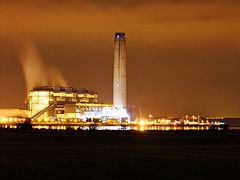UK must take ‘decisive action now on green economy’ or face costly energy future
The UK Government says that there is no need to specify a set percentage of GDP to invest in low-carbon UK growth. Critics argue a lack of upfront investment may mean we spend much more in the long term to green the economy than is necessary.

 The UK Government’s Department of Energy and Climate Change (DECC) has welcomed the United Nations report that called for 2% of global GDP to be invested in the emerging green economy, a spokesperson said. Critics argue the UK’s investments are dwarfed by those of countries such as South Korea and Germany. Failure to ramp up investments now, they say, will cost the UK dramatically more in the future.
The UK Government’s Department of Energy and Climate Change (DECC) has welcomed the United Nations report that called for 2% of global GDP to be invested in the emerging green economy, a spokesperson said. Critics argue the UK’s investments are dwarfed by those of countries such as South Korea and Germany. Failure to ramp up investments now, they say, will cost the UK dramatically more in the future.
The UN estimates that about $1.3 trillion, equivalent to about two per cent of global GDP, will need to be invested overall – crucially in areas that will reduce global CO2 emissions. This announcement prompted critics and analysts to ask whether the UK Government invests enough to stimulate the green economy.
Ed Matthew, programme director of Transform UK, an initiative focused on accelerating investment in the low-carbon economy. said: “Climate change represents the biggest market failure known to man. There is a low-carbon revolution happening – a global race. Who is going to reap the rewards in industry, manufacturing and jobs? Not the UK, under the current investment levels.”
Matthew’s argument is supported by the fact that countries like Germany and South Korea spend far more on green investment than the UK. For example, 80% of South Korea’s recession stimulus plan was targeted at low-carbon investment, compared to 10% of the UK’s stimulus plan.
The DECC spokesperson said: “I think the UN report (which was released on February 21) matches what the Government is actually doing and reinforces the need to take this approach.
“The UN report is another reason to highlight investing in green growth. We are doing this in the UK via initiatives to reform the UK electricity market; clean coal, through carbon capture and storage (CCS); reducing inefficient energy use through the ‘green deal’ and via the ‘feed-in tariff’.”
After a comprehensive spending review in 2010, the Government initiated a portfolio of low-carbon projects to stimulate the green economy and the renewable energy sector.
These include:
• £1 billon for a CCS demonstration project in development with Scottish Power
• £800 million for the renewable heat industry, instead of gas
• £200 million for low-carbon technology, which includes upgrading UK ports to install offshore wind facilities
The Government currently sets a limit on emissions by compiling a five-year carbon budget with the legal obligation to reduce emissions under the Carbon Reduction Commitment, set by the Treasury.
Matthew argued that this is the bare minimum to reach policy targets under the Climate Act and that low-carbon growth is not important to the Treasury. The UK Treasury currently takes a market-based approach to the green economy – allowing the market to drive low-carbon investment.
“The Treasury needs a stronger green vision or risk ending up importing expensive green energy and technology made abroad,” said Matthew.
The UN report states that investing one and a quarter per cent of global GDP each year in energy efficiency and renewable energies could cut global primary energy demand by 9% in 2020 and close to 40% by 2050.
The UN says the report “challenges the myth of a trade-off between environmental investments and economic growth and instead points to a current gross misallocation of capital.”
Image: Barrie Caveman | flickr




